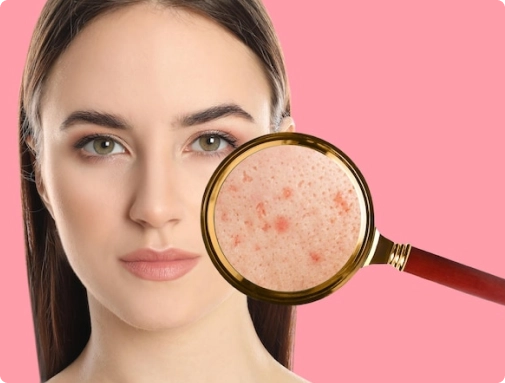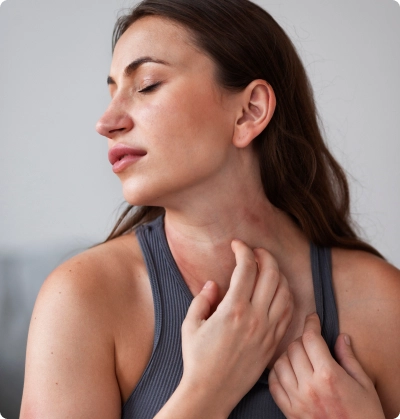Skin Conditions
Skin Conditions: Diagnosis, Treatment & Telehealth Support
Skin conditions are among the most common reasons people seek medical attention. The skin is the body’s largest organ, and when it becomes irritated, inflamed, or infected, it can lead to discomfort, visible symptoms, and affect one’s overall quality of life. From minor rashes to chronic conditions, prompt diagnosis and appropriate treatment are crucial for optimal skin health. At E-Health Network, we provide expert care for a wide range of skin conditions through our convenient telehealth platform.

Common Skin Conditions We Address
Acne
Acne is one of the most common skin conditions, primarily affecting teenagers but also adults. It involves the clogging of hair follicles with oil and dead skin cells, leading to pimples, cysts, and pustules. Causes may include hormonal changes, stress, diet, and genetics. If untreated, acne can lead to scarring.
Eczema (Atopic Dermatitis)
Eczema is a chronic condition that causes red, itchy, and inflamed skin. It often affects the face, hands, and joints and can be triggered by environmental factors, allergens, and irritants. Eczema flare-ups can lead to dry, cracked skin and secondary infections.
Psoriasis
Psoriasis is an autoimmune condition where skin cells reproduce too quickly, leading to thick, scaly patches. It commonly appears on the scalp, elbows, knees, and lower back. Psoriasis can be exacerbated by stress, infections, or certain medications, and it is often associated with other conditions like arthritis.
Rosacea
Rosacea is a chronic condition that causes redness and visible blood vessels on the face, often in the cheeks, nose, chin, and forehead. It may also cause pimples or pustules. While the exact cause is unclear, triggers include spicy foods, alcohol, extreme temperatures, and stress.
Skin Infections
Skin infections can occur when harmful bacteria, fungi, or viruses invade the skin. These can result in conditions like cellulitis, impetigo, or fungal infections such as athlete’s foot or ringworm. Infections typically lead to redness, swelling, pain, and sometimes pus or blisters.
Skin Cancer
Skin cancer, including melanoma, basal cell carcinoma, and squamous cell carcinoma, is a leading cause of cancer deaths. It typically presents as unusual moles or skin changes. Early detection is critical, and treatment options include surgery, radiation, or topical therapies.
Recognizing Symptoms of Skin Conditions
Identifying the signs of skin conditions early can lead to more effective treatment. Common symptoms include:
- Redness or inflammation
- Itching or pain
- Dry, flaky, or scaly patches
- Blisters, rashes, or bumps
- Changes in moles or skin lesions
- Excessive sweating or oil production
- Bleeding or oozing from skin lesions
If you notice persistent or worsening symptoms, it’s important to seek medical advice for proper diagnosis and treatment.

Telehealth Services for Skin Conditions
E-Health Network’s telehealth platform allows you to access expert care from the comfort of your home:
- Same-Day Virtual Appointments:
Get quick access to healthcare providers who specialize in skin conditions for immediate consultation and treatment advice.
- Electronic Prescriptions:
We can send prescriptions for topical or oral treatments directly to your pharmacy for easy fulfillment.
- Ongoing Monitoring and Follow-up:
Regular virtual follow-up consultations help track your progress, ensure your treatment is effective, and provide adjustments as necessary.
- Educational Resources:
We provide educational materials on skin care, lifestyle changes, and preventive measures to help you manage your skin condition effectively.
Preventing Skin Conditions
Preventing skin conditions often involves simple lifestyle modifications and proper skin care:
Sun Protection: Always wear sunscreen with at least SPF 30, especially during peak hours (10 a.m. to 4 p.m.), to protect against harmful UV rays that can lead to premature aging, skin damage, or skin cancer.
Maintain a Healthy Skincare Routine: Cleanse your skin gently with non-irritating products. Moisturize regularly to keep skin hydrated and prevent dryness or cracking, especially in conditions like eczema and psoriasis.
Avoid Triggers: Identify and avoid triggers that may worsen your skin condition, such as harsh soaps, stress, allergens, or certain foods.
Hydration:Drink plenty of water throughout the day to maintain skin hydration and support overall skin health.
When to Seek Immediate Care
Certain symptoms may indicate a severe or urgent skin condition that requires immediate medical attention:
- Severe pain, swelling, or redness
- Rapidly spreading rashes or lesions
- Bleeding or oozing from skin lesions
- Signs of infection (such as fever, pus, or increasing redness)
- Changes in the size, shape, or color of a mole
- Severe itching or discomfort affecting daily activities
If you experience any of these symptoms, it’s important to consult with a healthcare provider right away for proper evaluation.
Schedule a Telehealth Appointment
If you’re experiencing symptoms of a skin condition or have concerns about your skin health, don’t wait. Our telehealth services offer convenient, effective care from the comfort of your home. Schedule a consultation today and take the first step toward healthier, clearer skin.
